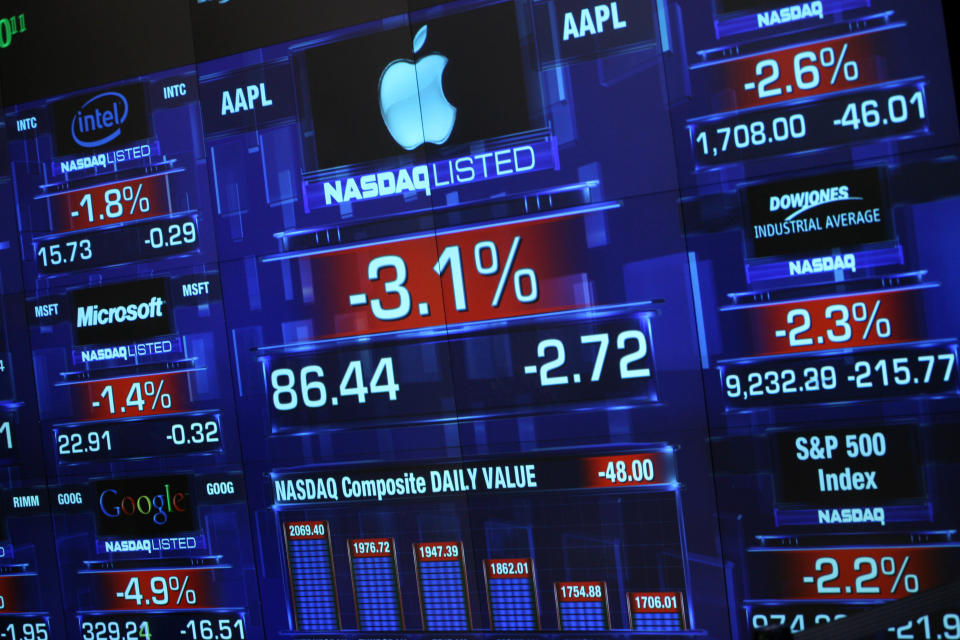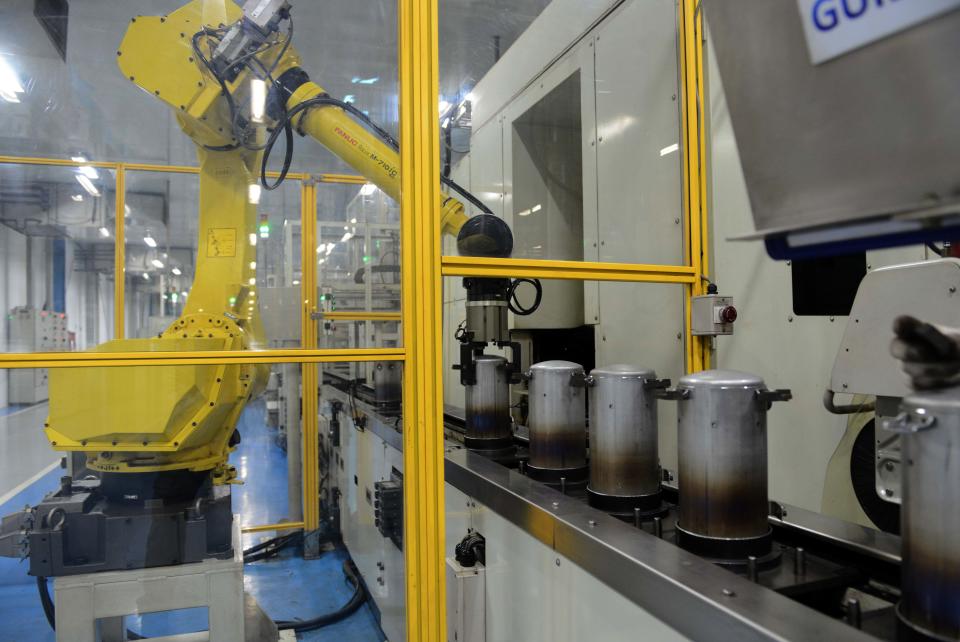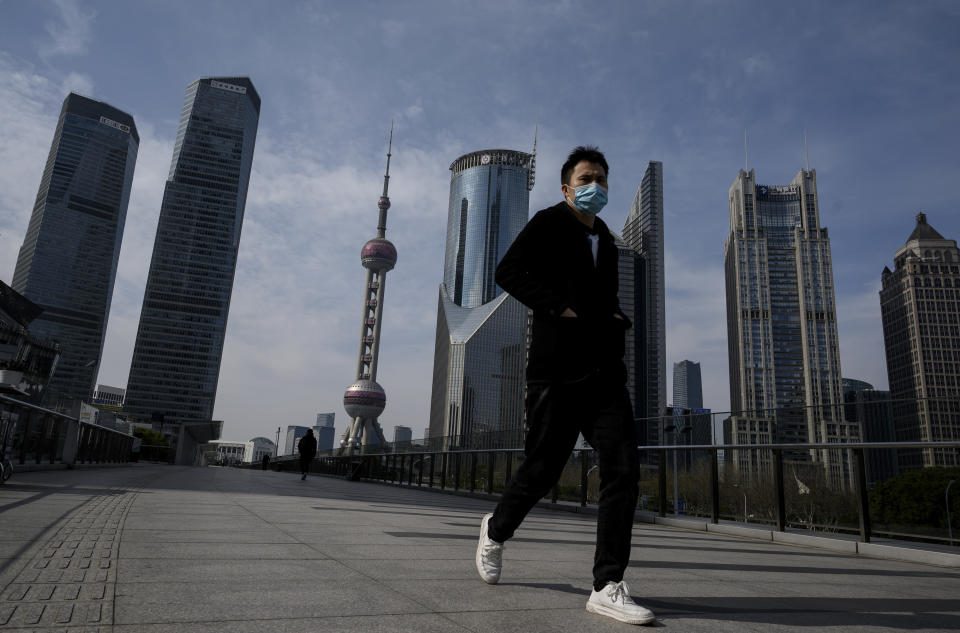Stock market news live: S&P 500, Nasdaq see closing highs; Slack halted for coming news
U.S. stocks kicked off the week slightly higher, shaking off earlier declines as the coronavirus death toll overtook that of the 2002-2003 SARS outbreak.
Later this week, investors will receive a myriad of corporate earnings results, January retail sales data and semi-annual congressional testimony from Federal Reserve Chair Jerome Powell.
Here’s a look at what’s moving markets on Tuesday, February 11.
—
4:43 p.m. ET: Slack says IBM has been its largest customer for years, addressing earlier media reports
Slack, in an SEC filing late Monday, said IBM has been slowly expanding its usage of Slack and has been Slack’s largest customer for several years.
The filing was in response to a Business Insider article earlier Monday saying that IBM had purchased Slack’s software for its employees to use worldwide. After the report, Slack shares were up as much as 21% intraday before paring some gains.
Slack also added that it is not updating its financial guidance for the fourth quarter or full year of the fiscal year ending January 31.
Shares of Slack resumed trading after market close at 4:43 p.m. ET.
—
4:02 p.m. ET: Stocks close higher, S&P 500 and Nasdaq see closing highs
Here’s where the major indices were as of 4:02 p.m. ET:
S&P 500 (^GSPC): +0.73% or +24.42 points to 3,352.13
Dow (^DJI): +0.60% or +174.27 points to 29,276.78
Nasdaq (^IXIC): +1.13% or +107.88 points to 9,628.39
Crude oil (CL=F): -1.57% or -0.79 to 49.53 a barrel
Gold (GC=F) +0.21% or +3.30 to 1,576.70 per ounce
—
3:49 p.m. ET: Slack stock halted
Slack (WORK) stock was halted at 3:49 p.m. ET, possibly ahead of an announcement, according to Bloomberg. The stock is up more than 15% so far on Monday.
Earlier Monday, reports suggested IBM (IBM) was going to have its more than 350,000 employees use Slack’s workplace communications technology, immediately unlocking a huge new user base and corporate customer for the newly public company.
__
1:55 p.m. Earnings are topping expectations, but...

All things considered, it’s been a banner earnings season as nearly70% of S&P 500 companies beat estimates, Refinitiv data showed — well above the long-term average.
Still, Blackrock thinks the bar is being set too high, and all but guarantees a letdown:
“Analysts currently expect U.S. earnings to grow about 9% in 2020, a hair lower than the typical range for the start of the year. Yet we see that as an ambitious goal given potential for rising wages and other cost increases to further compress corporate margins. Our analysis of U.S. corporate profit margins over the stages of the business cycle since 1965 showed that profit margins have tended to contract in late-cycle periods. High earnings expectations, combined with these late-cycle dynamics and more attractive valuations in other regions, set a high bar for sustained U.S. outperformance.”
Add in the upcoming U.S. general election and coronavirus, and companies need to brace for “the potential for a highly volatile and noisy nine months ahead [featuring] a wide range of potential policy outcomes,” the investment giant said:
The bottom line: We stick to our view that global growth will edge higher in 2020 but expect the pickup to be delayed. U.S. equities could outperform on any further growth scares triggered by the coronavirus outbreak, given their quality bias and perceived resilience. But we remain neutral on U.S. equities, given elevated political uncertainties and the risk to margins. Overall, we stand by our moderate pro-risk stance, and expect an eventual growth pickup to support cyclical equity markets such as EM and Japan. Within U.S. equities we favor quality companies with above average return on equity, low leverage and strong cash flow.
—
12:20 p.m. ET: Retail shipments see ‘sharper-than-usual’ drop
The National Retail Federation, which tracks retail shipment volumes at major U.S. ports, warned on Monday that the coronavirus epidemic is adding to the typical slowness associated with Lunar New Year. That means a usual slump is “sharper-than-usual,” the organization says:
“February is historically a slow month for imports because of Lunar New Year and the lull between retailers’ holiday season and summer, but this is an unusual situation,” NRF Vice President for Supply Chain and Customs Policy Jonathan Gold said.
“Many Chinese factories have already stayed closed longer than usual, and we don’t know how soon they will reopen. U.S. retailers were already beginning to shift some sourcing to other countries because of the trade war, but if shutdowns continue, we could see an impact on supply chains.”
Accordingly, trying to forecast container volumes “has become even more challenging” and it’s far from clear when the manufacturing sector will normalize, the NRF said.
—
11:20 a.m. ET: Investors unprepared for this ‘tectonic shift’

In a lengthy study published Monday, Bank of America put a new spin on a slowly unfolding story: Namely, that global supply chains are migrating to other countries like Southeast Asia, India and even North America.
According to a BofA study, “...much more surprising was that companies in about half of all global sectors in North America declared an intent to 'reshore'. This was particularly true for high-tech sectors and industries for which energy is a key input. If borne out, this could represent the first reversal in a multi-decade trend.”
In all, multinational companies worth $22 trillion in market cap are being impacted, and the bank warns that investors may not be ready. So what’s behind the shift? BofA noted there are several reasons, but among them are tariffs, narrowing tax advantages, and national security. And the kicker:
“In our view, these movements are ‘tectonic’: slow moving, persistent with major changes to the business environment for global companies.
“...We don't think investors are fully prepared for this tectonic shift. In our view, the US could be a significant beneficiary of this process, while Chinese firms are perhaps most at risk. Even more striking, our survey found almost universal intent to use automation.”
As such, the bank recommends adding exposure in automation, industrials and banks stocks in the regions set to become beneficiaries of the shift.
—
11:00 a.m. ET: Stocks and the coronavirus outbreak
In the last couple of sessions, Wall Street has had a delayed reaction to coronavirus fears. Yet according to DataTrek, there are several reasons why stocks haven’t priced in more aggressive losses:
All told, the firm points out that the stock market is more of a leading indicator, with investors pricing in where growth/earnings will end up in 6 months time. “Investors see the real possibility of a period of global economic catch-up” in the second half — and a Trump reelection bolstering next year and beyond.
—
10:34 a.m. ET: Stocks push higher, shaking off coronavirus fears
After opening slightly to the downside, the S&P 500 and Dow pushed into positive territory about an hour into the regular trading session.
Here were the main moves in markets, as of 10:35 a.m. ET:
S&P 500 (^GSPC): +0.36% or +11.85 points to 3,339.55
Dow (^DJI): +0.33% or +96.18 points to 29,198.69
Nasdaq (^IXIC): +0.53% or +51.07 points to 9,571.58
Crude oil (CL=F): -0.74% or -0.37 to 49.95 a barrel
Gold (GC=F) +0.22% or +3.40 to 1,576.80 per ounce
—
10:32 a.m. ET: Tesla’s stock jumps again, extending incredible run
Tesla’s (TSLA) stock rose as much as much as 9.6% on Monday to $819.99 at the highs of the morning session, as shares of the electric car-maker continued to surge.
The stock received an apparent boost over the weekend after Chinese officials said Tesla’s Shanghai Gigafactory would resume production Monday, Feb. 10, with the government helping it work through the spread of the coronavirus, Reuters reported.
Tesla executives had said during their earnings call with investors late last month that the company would see a 1-1.5 week delay in ramping production at the Shanghai Gigafactory amid the coronavirus.
Shares of Tesla were up about 80% for the year to date through Friday’s close.
—
10:27 a.m. ET: U.S. economic growth could take a hit in Q1 as coronavirus impact spreads
U.S. real gross domestic product growth could slow well below 1% in the first quarter as the impact of the coronavirus takes hold, according to a note from UBS economist Seth Carpenter Monday. These effects, however, will likely reverse in the second and third quarters this year, he added.
We see the net effect on the US as being small, but the quarterly swings are likely to be measurable. For the US, we see the effect coming through three channels: tourism, exports, and a temporary disruption to manufacturing because of delayed imports. For Q1, we have trimmed our real GDP estimate by 0.2 [percentage points] to a 0.4% [quarter on quarter] annual rate. We assume that the hit in the US from the coronavirus is mostly reversed over the course of Q2 and Q3. There are significant risks to this forecast. Our forecast change is conditional on China reopening production next week and based on the China team’s assessment that production disruptions will be small.
UBS’s prediction for U.S. Q1 GDP is below that of the Atlanta Fed. The regional bank’s closely watched GDPNow model estimates real GDP growth of 2.7% in the first quarter.
—
10:20 a.m. ET: Chinese hackers charged with Equifax breach
Four Chinese military hackers have been charged in the 2017 breach of the Equifax credit reporting agency that affected nearly 150 million American citizens, Attorney General William Barr said Monday.
—
9:35 a.m. ET: U.S. stocks open little changed amid coronavirus outbreak
The Dow and S&P 500 opened slightly in the red Monday morning as fears over the coronavirus continued to mount. However, each index pared losses from the pre-market session.
Here were the main moves in markets, as of 9:35 a.m. ET:
S&P 500 (^GSPC): -0.05% or -1.6 points to 3,326.11
Dow (^DJI): -0.04% or -12.53 points to 29,089.98
Nasdaq (^IXIC): +0.05% or +7.35 points to 9,529.66
Crude oil (CL=F): -0.97% or -0.49 to 49.83 a barrel
Gold (GC=F) +0.28% or +4.40 to 1,577.80 per ounce
—
7:47 a.m. ET: Stock futures mixed as coronavirus death toll rises
Contracts on the three major indices were mixed Monday morning, after falling for the first time in five sessions on Friday. Fears over the spread of the deadly coronavirus continued to be a focal point for global investors.
As of Sunday evening, the coronavirus had claimed the lives of 908 in mainland China, and total cases rose to 40,171, according to China’s National Health Commission. Ninety-seven people died from the disease on Sunday alone. More have now been killed by the coronavirus than during the SARS outbreak of 2002 to 2003, which killed 774 individuals.
Tedros Adhanom Ghebreyesus, director-general of the World Health Organization, noted in a Twitter post Sunday that some coronavirus cases have begun to emerge even in individuals who did not travel to China.
There’ve been some concerning instances of onward #2019nCoV spread from people with no travel history to 🇨🇳. The detection of a small number of cases may indicate more widespread transmission in other countries; in short, we may only be seeing the tip of the iceberg.
— Tedros Adhanom Ghebreyesus (@DrTedros) February 9, 2020
In the UK, where there have so far been eight confirmed coronavirus cases, the country’s health secretary called the outbreak “a serious and imminent threat to public health.” Elsewhere, more than 3,000 people have been stuck on a cruise ship in Yokohama, Japan, in a two-week quarantine, with dozens on board having tested positive for the coronavirus. Separately, home-rental services Airbnb has halted bookings of all listings in Beijing through the end of February in effort to contain the coronavirus.
Here were the main moves during the pre-market session, as of 7:47 a.m. ET:
S&P futures (ES=F): 3,324.75, down 0.75 points or 0.02%
Dow futures (YM=F): 29,025.00, down 19 points or 0.07%
Nasdaq futures (NQ=F): 9,413.25, up points or 0.04%
Crude oil (CL=F): $50.18 per barrel, down $0.14 or 0.28%
Gold (GC=F): $1,575.10 per ounce, up $1.70 or 0.11%

—
Follow Yahoo Finance on Twitter, Facebook, Instagram, Flipboard, LinkedIn, and reddit.
Find live stock market quotes and the latest business and finance news
